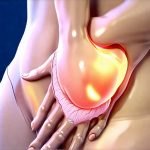Experiencing pain when urinating – dysuria as it’s medically known – can be incredibly distressing, and for many, this discomfort seems to intensify as the day wears on, peaking in the evening hours. This isn’t merely a coincidence; there are several physiological reasons why urinary pain might feel more pronounced later in the day, making understanding these factors crucial for managing symptoms and seeking appropriate evaluation. It’s important to remember that while this article explores potential causes, it is not a substitute for professional medical advice. If you are experiencing persistent or severe urinary pain, consulting with a healthcare provider is paramount.
The sensation of increased evening discomfort often arises from a confluence of factors related to both bodily changes throughout the day and lifestyle habits. During waking hours, we’re generally more active, leading to increased fluid intake (even if subtle) and potentially greater pressure on the bladder as muscles contract and shift with movement. These natural processes can subtly exacerbate underlying issues like mild infections or inflammation that might be asymptomatic earlier in the day. Furthermore, our bodies naturally conserve fluids during the daytime to maintain optimal function, concentrating urine which can irritate a sensitive urinary tract. As evening approaches, the body begins its transition toward rest, potentially leading to altered perceptions of pain and increased awareness of bodily sensations.
Physiological Changes & Evening Pain
The human body operates on circadian rhythms – internal biological clocks that regulate various physiological processes over a 24-hour cycle. These rhythms impact everything from hormone levels and sleep patterns to immune function and pain perception. As evening approaches, there’s often a natural shift in hormonal balance, including cortisol levels which tend to decrease later in the day. Cortisol has anti-inflammatory properties; its decline can potentially lead to increased sensitivity to pain signals, making existing urinary discomfort more noticeable. This isn’t necessarily about more inflammation developing but rather a reduced ability of the body to naturally suppress it.
Another key factor relates to fluid balance and kidney function. Throughout the day, our kidneys actively filter blood and produce urine. As we stand and move, gravity plays a role in how fluids distribute within the body. When we begin to recline or prepare for sleep, this distribution changes; more blood flow may be directed towards the pelvic region, potentially increasing pressure on the bladder and intensifying any existing discomfort. This is particularly relevant if there’s already inflammation present, as increased pressure can further irritate sensitive tissues.
Finally, consider that our focus shifts in the evening. During busy daytime activities, we often distract ourselves from minor aches and pains. As we unwind and prepare for rest, distractions lessen, allowing us to become more attuned to bodily sensations – including urinary discomfort. This doesn’t mean the pain is worsening; it means we’re simply more aware of it.
Common Underlying Conditions & Evening Exacerbation
Urinary pain isn’t typically a condition in itself but rather a symptom of an underlying issue. Several conditions can cause dysuria, and many experience increased discomfort as the day progresses. – Urinary Tract Infections (UTIs) are perhaps the most common culprit. The bacteria causing UTIs thrive in warm, moist environments, and a full bladder provides ample opportunity for growth. Symptoms like frequent urination, urgency, and burning sensations during urination can become more pronounced as the bladder fills throughout the day and bacterial activity increases. Understanding how uti pain manifests is important for quick recognition. – Interstitial Cystitis (IC) or Bladder Pain Syndrome is a chronic condition characterized by persistent bladder pain and urinary frequency/urgency without evidence of infection. The exact cause remains unknown but is thought to involve inflammation and nerve sensitivity within the bladder walls. Evening discomfort in IC often stems from increased awareness of these sensations as distractions diminish and the body prepares for rest. It’s important to rule out other conditions, like whether bladder pain could be misdiagnosed in women. – Kidney Stones can lead to intense, fluctuating pain that radiates from the back or flank down to the groin and urinary tract. While kidney stones themselves don’t directly cause urinary pain during urination, they can irritate the ureters (tubes connecting kidneys to bladder) causing inflammation and discomfort when urinating. If you suspect a stone, understanding kidney stone pain patterns can be helpful.
The key is recognizing that these conditions often have varying degrees of intensity throughout the day. A mild UTI might be barely noticeable in the morning but become significantly more bothersome by evening as bacterial load increases. Similarly, IC symptoms can fluctuate based on stress levels, dietary intake, and physical activity – all factors that change throughout the day. It’s crucial to pinpoint the underlying cause with a healthcare professional’s help to determine appropriate treatment and management strategies.
Lifestyle Factors Contributing to Evening Pain
Beyond physiological changes, several lifestyle factors can contribute to increased urinary pain in the evening. – Dietary Choices: Certain foods and beverages can irritate the bladder and worsen dysuria symptoms. These include caffeine, alcohol, spicy foods, acidic fruits (citrus), and artificial sweeteners. Consuming these items later in the day might lead to increased discomfort at night. – Fluid Intake: While staying hydrated is essential, drinking large amounts of fluid close to bedtime can increase urine production and bladder filling, potentially exacerbating symptoms. It’s often recommended to moderate fluid intake a few hours before sleep. – Constipation: A less-obvious connection exists between constipation and urinary pain. Constipation can put pressure on the pelvic organs, including the bladder, leading to discomfort and irritation. Addressing constipation through dietary changes (increased fiber) and adequate hydration can sometimes alleviate these symptoms.
It’s important to note that these lifestyle factors don’t cause urinary pain but rather aggravate existing conditions or sensitivities. For example, someone with IC might find their symptoms significantly worsened by caffeine consumption in the evening. Similarly, a person prone to constipation may experience more noticeable bladder discomfort when constipated. Identifying and modifying these contributing factors can be an effective part of managing overall symptom burden.
When to Seek Medical Attention
While many cases of mild urinary pain resolve on their own or with simple lifestyle adjustments, certain symptoms warrant immediate medical attention. – Severe Pain: Intense, debilitating pain that interferes with daily activities requires prompt evaluation. – Fever & Chills: These are signs of a possible infection and should be addressed immediately. – Blood in Urine (Hematuria): This is always a cause for concern and needs to be investigated by a healthcare provider. – Difficulty Urinating or Inability to Urinate: This could indicate a blockage or other serious issue. – Flank Pain: Pain radiating from the back, particularly if accompanied by nausea and vomiting, might suggest kidney stones.
It’s crucial to remember that self-diagnosis can be dangerous. A healthcare professional can accurately diagnose the underlying cause of your urinary pain and recommend appropriate treatment options. This may include antibiotics for UTIs, medication for IC, or other interventions depending on the specific condition. Don’t hesitate to seek medical help if you are concerned about your symptoms. Recognizing lower back pain as a potential sign is also important for proactive care.





















